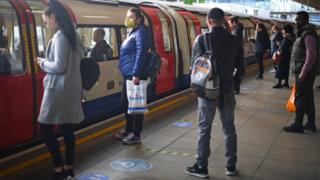Caution means mass return to work unlikely, say firms
 Image copyright PA Media
Image copyright PA Media Businesses remain cautious about the latest lockdown easing for England, and warn that any mass return to work immediately was unlikely.
The British Chambers of Commerce said companies still needed «crystal-clear official guidance» on safety.
And the Institute of Directors said «there is a significant amount of caution out there» in the country.
New guidelines cover using public transport, while advice for employers will change from 1 August.
Companies will have more discretion to bring staff back to workplaces if it is safe to do so, the PM has said.
Edwin Morgan, director of policy at the Institute of Directors, doubted there would be a significant return to offices and other workplaces any time soon. «Businesses need to balance the risks, and won’t want to increase the possibility of closures down the line by rushing back.
«On top of this, not everything is in a company’s control. Childcare is an issue for many employees, and even if the guidance is changed, some staff who use public transport will still be concerned.»
Other employers’ organisations said firms still wanted government support to help smooth the return to work process.
Mike Cherry, national chairman of the Federation of Small Businesses, said that smaller firms in particular would need more support in order to get workers back.
«Small firms are being tasked with consulting employees and putting the right measures in place to ensure a safe return to work,» he said. «After weeks of little or no income, they will need help – both funding and advice – to make that happen.»
The British Chambers of Commerce (BCC) said companies should get tax breaks to re-open offices. BCC director general Adam Marshall said: «Businesses should be able to offset the investments they make to ensure their premises are Covid-secure against their tax bill, which would help many to return to workplaces over the coming months.»
The TUC backed calls for more support for companies. TUC general secretary Frances O’Grady said Friday’s announcement was the government «passing the buck on this big decision to employers».
She pointed out that returning to work safely required a functioning NHS Test and Trace system, «Yet progress on test and trace is still patchy». She added: «A safe return to workplaces also requires much greater investment in public transport if people are to be able to commute.»
Flexible working
There is an expectation among many employers that home working will remain in place for thousands of companies despite Friday’s announcement.
«People are not comfortable returning to the office yet,» said Ruth Duston, chief executive of South Westminster Business Improvement District, which represents the interests of 5,000 businesses across London.
«Even when offices do start returning, we are looking at perhaps only a max of a third of workers returning to offices at any one time to allow for social distancing.»
She said cities should prepare for a permanent shift in working practices. «People will return [to offices] but this will likely be a gradual process over many months. When they do, it will be to collaborate and exchange with their colleagues rather than to spend eight hours at a desk.»
At-a-glance: The latest changes in England
- From 25 July indoor gyms, pools and other sports facilities can reopen
- On 1 August the government will update its advice on going to work, asking employers to make decisions about how and where their staff can work safely
- From the same date, most remaining leisure settings, including bowling, skating rinks, casinos and all close contact services such as beauticians, will be allowed to reopen
- Live indoor theatre and concerts will be able to resume with socially distanced audiences
- Wedding receptions for up to 30 people will also be allowed from next month
- From September, schools, nurseries and colleges will be open for all children and young people on a full-time basis, while universities are also working to reopen as fully as possible
- From October, the government intends to allow audiences to return to stadiums, while conferences and other business events can recommence, subject to the outcome of pilots
Mr Marshall said many of the BCC’s members were focused on changes to flexible working practices rather than getting everyone back in the office. «Firms will be weighing up how they want to work in future. Many have seen benefits to productivity and work-life balance over recent months and will want to keep elements of their new normal,» he said.
And the IoD said that as many as two thirds of its members said they intend to keep increased flexible working in place after lockdown ends.
A recent Chartered Institute of Personnel and Development survey found that employers, overall, report home workers are at least as productive as other workers, and plan to double the proportion of staff who work from home regularly once the crisis is over.
Do you expect to return to work? Are you concerned? How are you feeling about it? Share your experiences by emailing haveyoursay@bbc.co.uk.
Please include a contact number if you are willing to speak to a BBC journalist.


